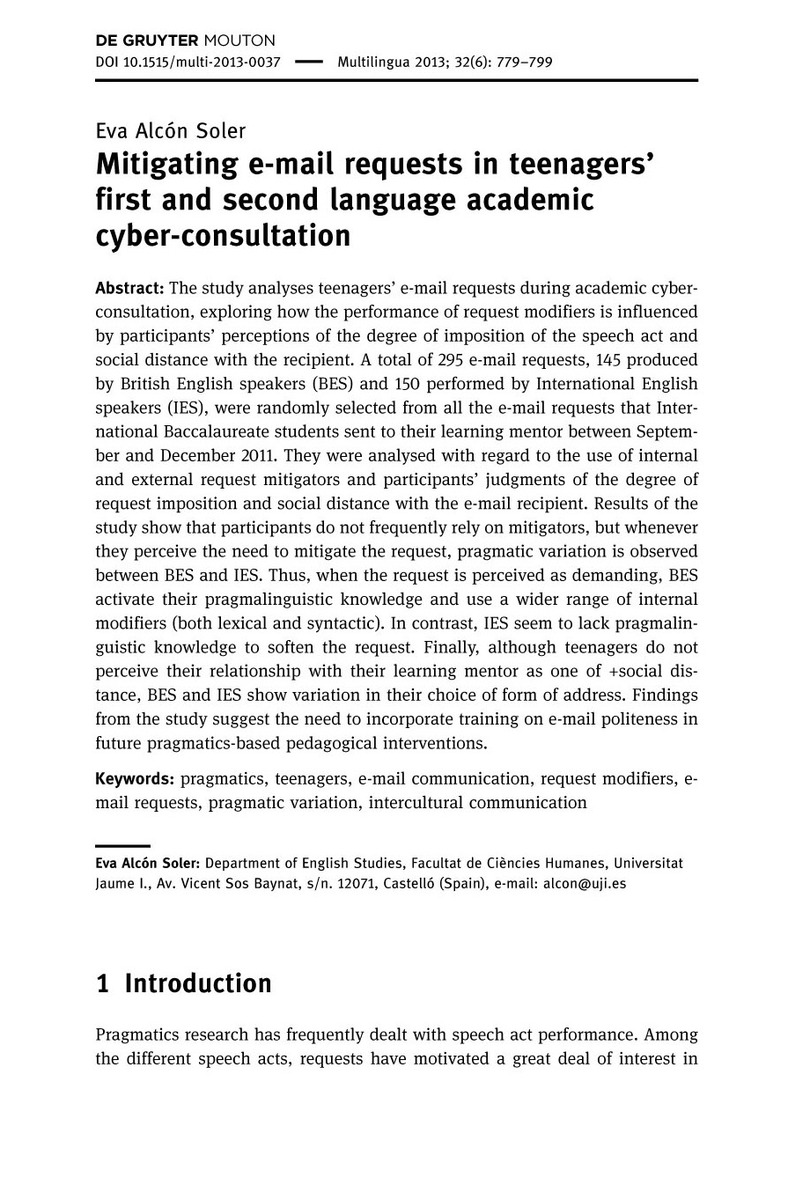Mostrar el registro sencillo del ítem
Mitigating e-mail requests in teenagers’ first and second language academic cyber-consultation
| dc.contributor.author | Alcón, Eva | |
| dc.date.accessioned | 2014-07-23T07:43:27Z | |
| dc.date.available | 2014-07-23T07:43:27Z | |
| dc.date.issued | 2013 | |
| dc.identifier.citation | ALCÓN SOLER, Eva. Mitigating e-mail requests in teenagers’ first and second language academic cyber-consultation. Multilingua - Journal of Cross-Cultural and Interlanguage Communication, 2013, vol. 32, no 6, p. 779–799 | ca_CA |
| dc.identifier.issn | 0167-8507 | |
| dc.identifier.issn | 1613-3684 | |
| dc.identifier.uri | http://hdl.handle.net/10234/97843 | |
| dc.description.abstract | The study analyses teenagers’ e-mail requests during academic cyber-consultation, exploring how the performance of request modifiers is influenced by participants’ perceptions of the degree of imposition of the speech act and social distance with the recipient. A total of 295 e-mail requests, 145 produced by British English speakers (BES) and 150 performed by International English speakers (IES), were randomly selected from all the e-mail requests that International Baccalaureate students sent to their learning mentor between September and December 2011. They were analysed with regard to the use of internal and external request mitigators and participants’ judgments of the degree of request imposition and social distance with the e-mail recipient. Results of the study show that participants do not frequently rely on mitigators, but whenever they perceive the need to mitigate the request, pragmatic variation is observed between BES and IES. Thus, when the request is perceived as demanding, BES activate their pragmalinguistic knowledge and use a wider range of internal modifiers (both lexical and syntactic). In contrast, IES seem to lack pragmalinguistic knowledge to soften the request. Finally, although teenagers do not perceive their relationship with their learning mentor as one of +social distance, BES and IES show variation in their choice of form of address. Findings from the study suggest the need to incorporate training on e-mail politeness in future pragmatics-based pedagogical interventions. | ca_CA |
| dc.description.sponsorShip | This study has been conducted within the framework of a research project funded by the Spanish Ministerio de Economía y Competitividad, co-funded by FEDER (FFI2012-38145). The data for the present study was collected thanks to the possibility that the author had to participate in the academic mobility programme for senior researchers (PR2011-0486). I would like to express my gratitude to the anonymous reviewers for the insightful suggestions. 1 am also grateful to César Félix-Brasdefer and Maria EconomidouKogetsidis for their comments on an earlier version of the paper. | ca_CA |
| dc.format.extent | 21 p. | ca_CA |
| dc.format.mimetype | application/pdf | ca_CA |
| dc.language.iso | eng | ca_CA |
| dc.publisher | De Gruyter | ca_CA |
| dc.relation.isPartOf | Journal of Cross-Cultural and Interlanguage Communication (2013) vol. 32, no 6 | ca_CA |
| dc.rights | Copyright © 2011–2014 by Walter de Gruyter GmbH | ca_CA |
| dc.rights.uri | http://rightsstatements.org/vocab/InC/1.0/ | * |
| dc.subject | Pragmatics | ca_CA |
| dc.subject | Teenagers | ca_CA |
| dc.subject | e-mail communication | ca_CA |
| dc.subject | Request modifiers | ca_CA |
| dc.subject | e-mail requests | ca_CA |
| dc.subject | Pragmatic variation | ca_CA |
| dc.subject | Intercultural communication | ca_CA |
| dc.title | Mitigating e-mail requests in teenagers’ first and second language academic cyber-consultation | ca_CA |
| dc.type | info:eu-repo/semantics/article | ca_CA |
| dc.identifier.doi | http://dx.doi.org/10.1515/multi-2013-0037 | |
| dc.rights.accessRights | info:eu-repo/semantics/openAccess | ca_CA |
| dc.relation.publisherVersion | http://www.degruyter.com/view/j/mult_mult.2013.32.issue-6_2013/multi-2013-0037/multi-2013-0037.xml | ca_CA |
| dc.type.version | info:eu-repo/semantics/publishedVersion |
Ficheros en el ítem
Este ítem aparece en la(s) siguiente(s) colección(ones)
-
ANG_Articles [305]







